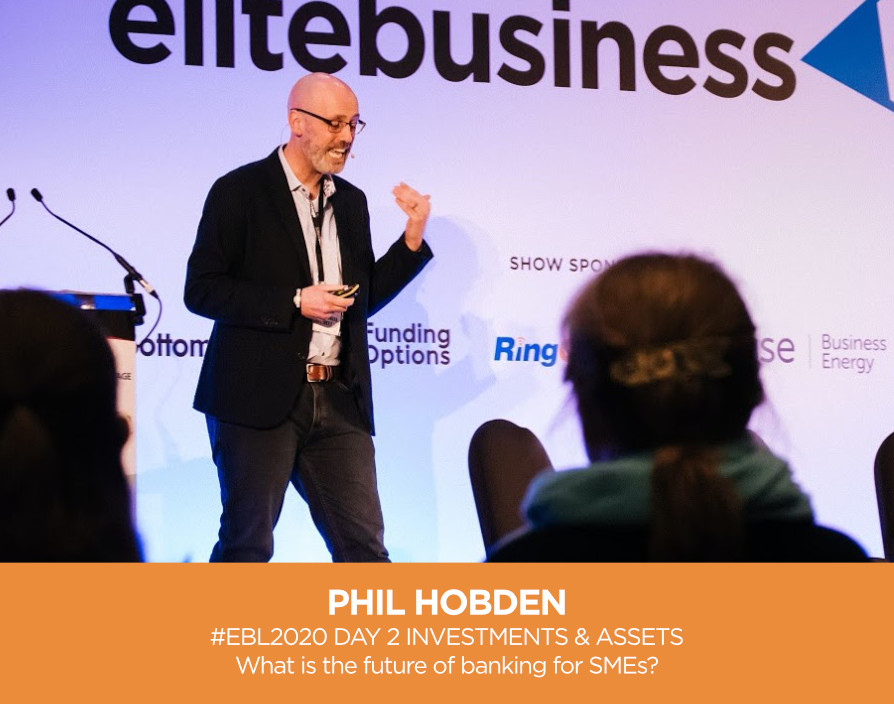How can SMEs choosethe right bank for them?
Banks and lenders are now finding new ways to create innovative products and provide flexible financial solutions for businesses as bank and building branches disappear from high streets. With a rise in technology and newly emerging digital platforms, how can SMEs adapt to these new ways of baking? What are the options available out there? Speaking on the second day Elite Business’ live event on March 10, Phil Hobden, Head of Education at Capitalise spoke about how banking has changed over the past decade and how businesses can choose the right bank for them in a banking revolution.
Thousands of banks across the country have shut down branches to pave the way for a rise in online banking, with an increasing number of customers shun physical branches. Long gone are the days where businesses can build a relationship with their banking manager to sit down and discuss their finance options. With hundreds of staff being made redundant over the past few years, businesses have faced an impact in that loss of connection and relationship they once had with their banking managers, along with a shortage of skills and knowledge these people provided to the banks. 90% of SMEs don’t know or have a relationship with their bank manager, Phil said. 15 to 20 years ago, that number was closer to 15% to 20% who didn’t know their bank manager. Think of the impact of that. You’re looking to grow your business, you’re looking to grow what you do, you’re looking to expand, you’re looking to take on new finance… Who can you talk to? Who can you have a conversation with? But it’s not surprising because the banking industry as a whole has changed massively…. And this isn’t changing. Banks are not coming back to the high street. And the industry looks considerably different today than it did back then.
He added: There’s an impact in that loss of connection and relationship. We all know that what makes that relationship, that personal touch that helps businesses get to understand where they’re going and how banks understand what we’re doing. And actually, having the understanding of the seasonality of what you do, that the business is stronger than the current challenge it faces. Well, that’s gone. Secondly, there’s a loss of skill. And this comes in many different ways. There’s a loss of core banking and technology skills.
Whilst banks have retrenched from the high streets with branch closures, these same lenders are now finding a new form of banking with digital products. Traditional banks have come up with digital platforms as lenders find new ways to reduce the cost of acquisition and be able to offer more innovative products, and neo-banks, such as Monzo, Tide, Revolut and Starling, are on the rise.
Banking is in a time of revolution, evolution and disruption… Phil said. You have traditional banks that realise they now have to fight on a completely different battle grounds. So, they’re bringing these digital innovative products to market, or buying them.
He added: Then you got the neo-banks… These banks that have come out of people that have been in banking and finance and been through those struggles and challenges and those great people that have left have decided they could do things differently. And all of those banks are fantastic and innovative in their approach and what they do.
What are the challenges business owners face when it comes to banking? With hundreds of lenders in the UK alone and a diverse range of finance options, business owners are spoilt for choice when it comes to choosing who they bank with. However, SMEs need to overcome the fear of rejection when it comes to applying for finance. According to research, 47% of SMEs do not borrow for fear of being turned down.
SMEs need to be more aware of the increasingly diverse range of products need to be given to SMEs. So actually, to help you understand what’s out there, what’s good, what good rates are, Phil said. The one thing I never knew anything about running my business was finance… I certainly didn’t know what was out there. Secondly, encourage more businesses to seek advice. To be able to put your hands up and say ‘I don’t know what I’m doing and I need advice around that’. Worse still, is overcoming the fear of rejection. That still happens… Businesses are still scared to apply for finance for the fear they might be rejected, fearing it will leave a negative mark on their credit statement… Remember, 47% of businesses are permanent non-borrowers. It’s not necessarily because they want to be, but they feel they’ve got no choice.
Who will provide financial advice to businesses in a post-relationship banking word? SMEs need to think about who understands their business best in terms of finance. And it’s probably their accountant who can best fit the role of their banking manager as they understand the finance side of the business and can help advise which lending options would be the best fit, Phil said. “If you think about your business outside of your company, especially businesses where you don’t have your CFO, who understands your business best? Phil explained. Who knows your finance, what goes in, what goes out and what you’re spending on? It’s probably your accountant. There’s an advantage in that. You’re four times more likely to get the funding you need when you partner with a business advisor or an accountant. And beyond that, you’re more likely to get more money. Because actually, the accountant has the ability to kind of make the overall picture of your business better reflect what it is. As banks are closing down, having someone that can be there to support you is super important.
So, what is the future of banking and SMEs? Phil insisted that banks may very well offer niche services to businesses and SMEs and that online payment systems and corporations such as Paypal and Apple may be the new way of banking in the future. SMEs are also becoming more aware of alternatives to traditional funding, including peer to peer lending, crowdfunding platforms and venture capitalism. Banks historically have worked under the assumption that they must compete across a suite of banking products and must serve all clients across consumer, across SMEs and across corporate through all channels, Phil said. And that produced a significant and solid return for many years. But actually, that’s no longer true. Simply, it’s to be able to offer your best products and capabilities to other institution’s customers. Be willing to replace non-core products and capabilities with best class offerings from third parties. So rather than a bank offering everything to everyone, it could be a bank offering the best insurance services regardless of who that insurance is from. It could well be Apple offering a credit card that’s completely different to any other credit card, but that’s underwritten by a bank.
“
Share via:


















































